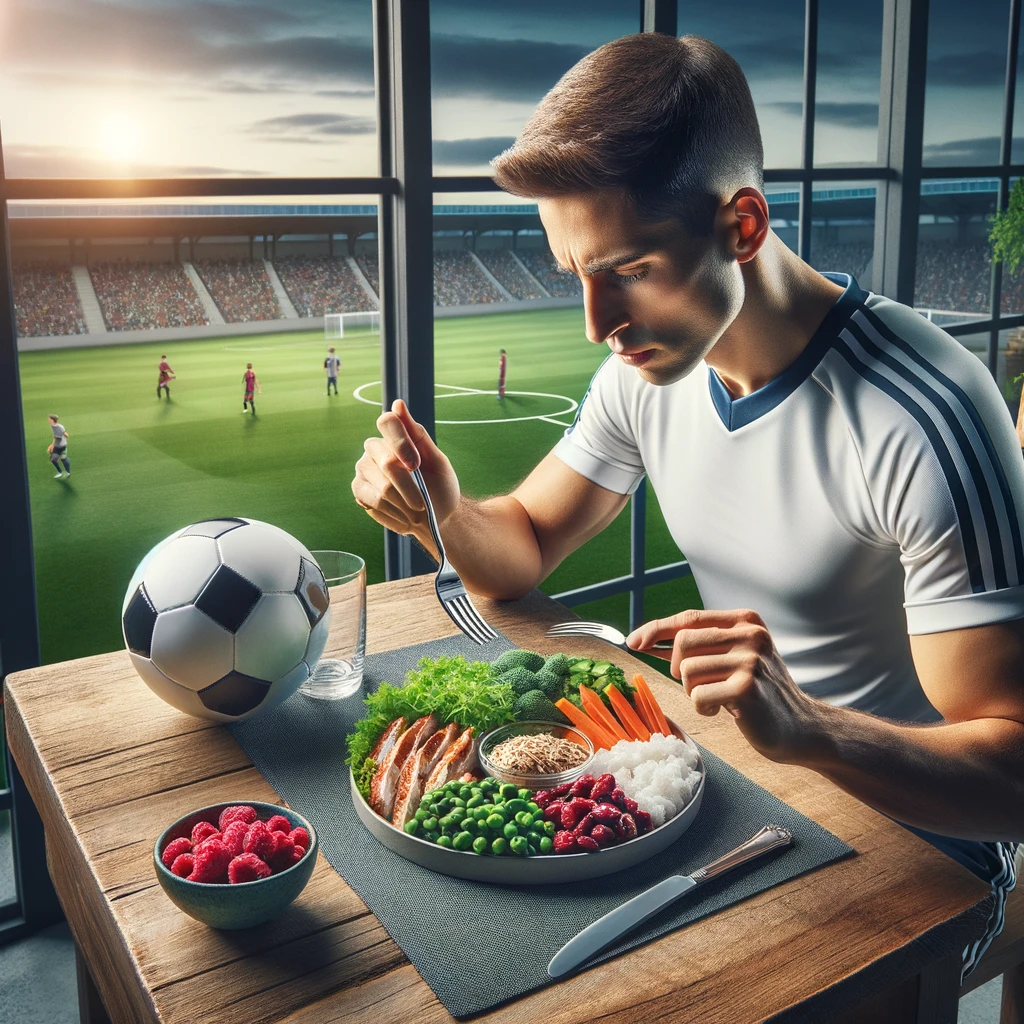Have you ever stopped to think about the impact of nutrition in your performance on the field?
It's not just about running more or kicking harder; it's about feeding your body what it needs for these moments and more. A sports nutrition for football athletes it's your game plan off the field, the secret to always being at the top of your game.
And it doesn't matter if you are a professional or just love the sport; nutrition is for everyone.
Let's explore together how to transform food into performance.
Browse the content

What is Sports Nutrition?
Sports nutrition is not just a diet; it's a strategy. It's understanding that each food has a role, whether it's providing energy, aiding muscle recovery or ensuring your body functions like a well-oiled machine.
Sports nutrition for football athletes means having the energy for explosive sprints, the strength for intense duels and the endurance to maintain the pace until the final whistle. But it's not just about what we eat; It's also about when and how much. It's the science behind the fuel we choose for our bodies.
Nutrition Fundamentals for Football Athletes
Macronutrients
Proteins: The building blocks of muscle reconstruction. After a game or workout, your body needs protein to repair muscles. Options such as chicken, fish, eggs and legumes are ideal.
Carbohydrates: Its main fuel. They give the energy your body needs for quick and lasting actions on the field. Choose complex sources such as whole grains and potatoes.
Fats: The long-lasting energy source. Healthy fats, found in avocados, nuts and fatty fish, are essential for overall health and nutrient absorption.
Micronutrients
Vitamins and minerals are equally crucial. They help with everything from muscle function to bone health. Include a variety of fruits and vegetables in your diet to ensure a good supply of micronutrients.
Hydration
Water is essential. It keeps your body functioning efficiently, especially on game days or training in the hot sun. Never underestimate the need to stay hydrated.
Diet Plan for Football Athletes
Creating a meal plan is like designing the perfect game strategy; requires attention to detail and adjustments as needed.
The goal is to ensure you get the essential nutrients your body needs to perform at its best, both in training and in games.
Pre workout: The focus here is on sustainable energy. A meal rich in complex carbohydrates, such as oatmeal, sweet potatoes, or quinoa, combined with a moderate source of lean protein, can provide the fuel you need without weighing down your stomach.
Add a small portion of healthy fats to ensure prolonged energy release.
After training: After giving it your all on the field, your body needs repair and refueling. A combination of high-quality proteins and quickly absorbed carbohydrates helps with muscle recovery and the replenishment of glycogen reserves.
Consider a protein smoothie with banana and peanut butter for a delicious and efficient recovery.
Daytime: Maintain a balanced diet with a variety of foods to ensure you get all essential micronutrients.
Colorful vegetables, fruits, whole grains, sources of lean protein and healthy fats should be part of your daily routine.
Sports Nutrition Supplementation for Football Athletes
Supplements can be important allies, especially in times of high nutritional demand or when obtaining certain nutrients is challenging from food alone.
Protein powder, for example, can be a convenient way to ensure adequate protein intake, especially post-workout. BCAAs can aid muscle recovery, while creatine provides support for high-intensity performance.
However, it's crucial to remember that supplements are just that: supplements. They do not replace a well-balanced diet.
Before beginning any supplementation, consult a healthcare professional or sports nutritionist to ensure it is suited to your individual needs.
Nutritional Strategies for Game Day
Game days require special attention to nutrition. A pregame meal, consumed 3 to 4 hours beforehand, should provide enough energy without causing gastrointestinal discomfort.
Complex carbohydrates, a moderate source of protein, and low fiber and fat can optimize performance without weighing down your stomach.
During gameplay, staying hydrated is crucial, especially in hot weather or intense games. Sports drinks can offer a quick source of energy and electrolytes lost through sweat.
After the game, the focus returns to recovery. Nourishing your body with protein for muscle repair and carbohydrates to replenish energy stores is vital. A well-balanced post-game meal or protein shake can speed your recovery.
Advanced Sports Nutrition Strategies for Football Athletes
Sports nutrition for football athletes is not just limited to the basics of proteins, carbohydrates and fats.
It's about customizing your diet to meet your body's specific needs, adapting to the demands of training, games and recovery. This section delves into advanced strategies that can help maximize your performance.
Nutritional Periodization
Just as training is adapted throughout the season, sports nutrition for football athletes must also be periodized. This means adjusting your macronutrient and calorie intake based on the training phase you're in.
During periods of intense training, increase carbohydrate intake to maximize energy reserves and focus on protein and recovery after games and practices.
Nutritional Timing
Timing of nutrient intake is another vital component of sports nutrition for football athletes. Consuming a combination of carbohydrates and proteins within 30 to 45 minutes after training can significantly improve muscle recovery and the replenishment of glycogen stores.
Additionally, a pre-workout meal or snack, consumed about two to three hours before activity, primes your body with the energy it needs for peak performance. Strategically integrating nutrition into your training and games is crucial to optimizing both recovery and performance on the field.
Personalized Hydration
The hydration strategy is another fundamental pillar of sports nutrition for football athletes. Each player has unique hydration needs, influenced by factors such as sweat rate, duration of activity and weather conditions.
Monitoring urine color and weight before and after workouts can help personalize fluid intake, ensuring adequate hydration for performance and recovery.
Anti-inflammatory Diet
Incorporating foods with anti-inflammatory properties into your diet can help with recovery and reducing pain and injuries.
Sports nutrition for football athletes can benefit from consuming foods rich in omega-3s, such as fatty fish, nuts and chia seeds, as well as fruits and vegetables rich in antioxidants.
These nutrients can help fight inflammation in the body, speeding up the recovery process.
Strategic Supplementation
Although the basis of sports nutrition for football athletes should be a balanced, nutrient-rich diet, supplementation can play a strategic role.
Supplements such as creatine, for example, have been shown to improve performance in high-intensity, short-duration activities, typical of football. Other supplements, such as beta-alanine, can help improve muscular endurance.
However, it is essential that supplementation is carried out under the guidance of a professional to ensure safety and effectiveness.
Nutritional Recovery
Recovery isn't just about what you do after your workout, it's also about how you nourish your body to repair and rebuild.
Sports nutrition for football athletes should include nutritional recovery strategies, emphasizing foods rich in high-quality proteins, carbohydrates to replenish energy stores, and healthy fats for cellular recovery.
Including variety and nutritional density in post-workout meals can speed up the recovery process, preparing the athlete for the next challenge.
The Role of Technology in Sports Nutrition for Football Athletes
As technology advances, the field of sports nutrition for football athletes has also evolved. Mobile apps, wearables and data analysis platforms are becoming crucial tools for personalizing diets and monitoring players' nutritional performance.
Mobile Applications for Nutritional Monitoring
Nutrition apps can help athletes track their daily food, calorie and nutrient intake, facilitating real-time adjustments based on training needs. These apps can also offer meal and snack suggestions optimized for your training goals.
Wearables for Hydration and Nutrition Monitoring
Wearable devices that monitor hydration and nutrient levels are becoming more sophisticated, offering athletes instant feedback on their hydration status and nutritional needs. This technology can help prevent dehydration and nutritional imbalances that can affect performance.
Data Analysis Platforms
Analysis of nutritional data collected during training and games allows for detailed customization of nutrition strategies. These analyzes can identify patterns that influence performance and recovery, allowing precise adjustments to athletes' diets.
Future Trends in Sports Nutrition for Football Athletes
Trends in sports nutrition are constantly evolving, with new research providing insights into how to further optimize your diet for athletic performance.
Plant-Based Eating
A growing trend is the adoption of plant-based diets, which have shown benefits not only for general health, but also for sports performance. These diets are rich in complex carbohydrates, fiber, antioxidants and phytonutrients that can aid in recovery and reduce inflammation.
Extreme Diet Personalization
With advancements in nutritional genomics and metabolic testing, diet personalization is becoming increasingly refined. In the future, it is possible for each athlete to have a completely personalized nutrition plan, based on their genome, metabolism and individual responses to different foods.
Success Stories: Football Athletes and Their Nutrition
Stories of athletes who elevated their game through nutrition are sources of inspiration. Cristiano Ronaldo, for example, is known for his dedication both on and off the field, including his meticulously planned diet.
His ability to maintain high-level performance over the years can be partially attributed to his strict approach to nutrition.
Lionel Messi, who faced challenges with nutritional deficiencies early in his career, adjusted his diet to overcome these barriers, demonstrating the transformation that proper nutrition can bring to health and performance.
Conclusion
Sports nutrition is a fundamental pillar for any football athlete who wants to maximize their potential. Through a carefully planned eating plan, consideration of supplements when necessary, and game-day-specific nutritional strategies, you can optimize your performance, recovery, and overall health.
Remember, the key to effective nutrition is customization and tailoring to your individual needs. With the right strategy, nutrition can be your greatest ally on the path to achieving your football goals.









Leave a Comment